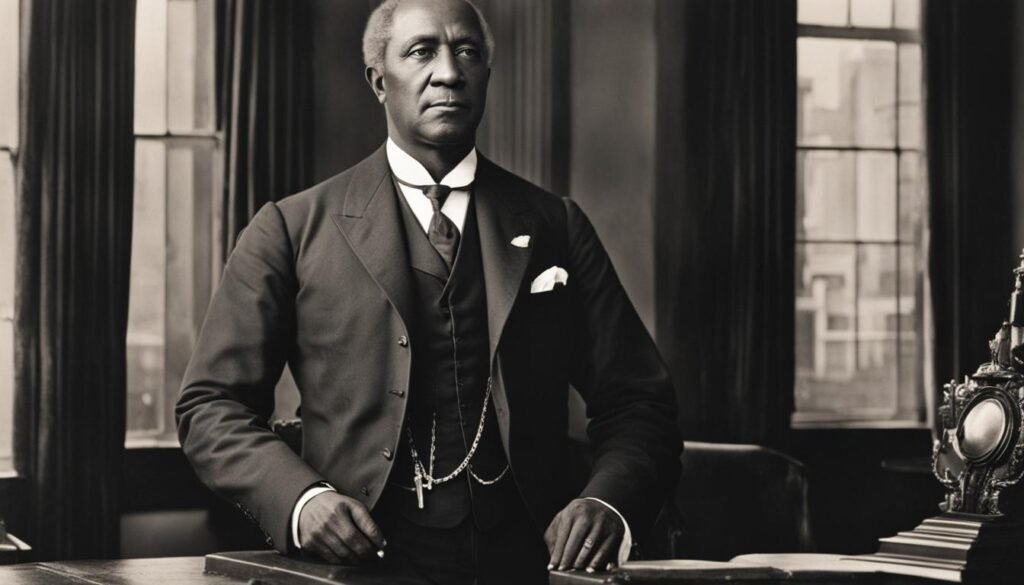Who is the First Black Millionaire?
The status of “millionaire” holds significant weight in American society, symbolizing success, ambition, and wealth. When examining the history of black individuals who achieved this milestone, several pioneering figures emerge. While Madam C.J. Walker is often celebrated as the first black millionaire in the United States, it is essential to recognize the accomplishments of others who predated her. These historical black figures overcame immense barriers to amass wealth and success, contributing to the formation of American capitalism.
Key Takeaways:
- There were black individuals who became millionaires before Madam C.J. Walker.
- William Alexander Leidesdorff was likely the first black millionaire in America.
- Other notable black millionaires include John Stanly, Jeremiah Hamilton, Mary Ellen Pleasant, Robert Reed Church, and Daniel Murray.
- These individuals achieved success in various industries, such as commerce, real estate, and entrepreneurship.
- Their stories serve as a testament to the resilience and ingenuity of African American entrepreneurs throughout history.
The Legacy of William Alexander Leidesdorff
William Alexander Leidesdorff (1810-1848) holds the distinction of likely being America’s first black millionaire. His entrepreneurial ventures and contributions to the development of San Francisco during the California Gold Rush have left a lasting legacy.
Leidesdorff was an influential figure in early San Francisco, making significant contributions to the city’s infrastructure and economic growth. He owned the first steamship in San Francisco Bay, revolutionizing transportation and trade in the region.
Not only was Leidesdorff a successful businessman, but he also played a pivotal role in establishing the first public school, hotel, and waterfront warehouse in San Francisco. His devotion to education and community development underscored his commitment to the growth and prosperity of the city.
Leidesdorff’s wealth was derived from his involvement in commerce and real estate, capitalizing on the opportunities presented by the California Gold Rush. His astute business acumen and foresight allowed him to amass a considerable fortune, positioning him as a trailblazing black entrepreneur.
In addition to his business endeavors, Leidesdorff was actively engaged in politics and public service. He served as the U.S. Vice Consul at San Francisco and held several important positions, including city treasurer, councilman, and school committee member.
William Alexander Leidesdorff’s remarkable achievements and contributions to the growth and development of San Francisco during the California Gold Rush solidify his place as a pioneering black entrepreneur and a beacon of inspiration for generations to come.
The Success of John Stanly
John Carruthers Stanly (1774-1845) was a remarkable figure in African American history. Born a mixed-race former slave, Stanly defied the odds and became one of the wealthiest black individuals in North Carolina. After gaining his freedom, he worked as a barber and steadily built his fortune.
Driven by ambition and resilience, Stanly not only achieved financial success but also became one of the largest slaveowners in the state. He owned two prosperous plantations, numerous houses, and various businesses, elevating his position in society and amassing significant wealth.
In addition to his prominent role as a slaveowner, Stanly ventured into different industries. He made strategic investments in real estate, contributing to the growth and development of the local economy. Stanly also ventured into cotton farming and turpentine manufacturing, further diversifying his sources of income and solidifying his position as a prominent entrepreneur.
The success and wealth attained by John Stanly hold immense significance in black history. His story exemplifies the complexities and contradictions of the era, shedding light on the presence of wealthy black individuals in a society deeply entrenched in slavery and racial oppression.
“Stanly’s journey from slave to successful businessman challenges conventional narratives, highlighting the diversity and resilience within the African American community during this period of history.”
To truly understand the rich tapestry of black history, it is critical to recognize and discuss the diverse experiences of individuals like John Stanly. His achievements defy traditional stereotypes and add depth to our understanding of black entrepreneurship and the complexities of the American past.
Key Achievements:
| Industry | Accomplishments |
|---|---|
| Real Estate | Strategic investments, contributing to local economic growth |
| Cotton Farming | Established successful cotton plantations |
| Turpentine Manufacturing | Built a thriving turpentine production business |
The accomplishments of John Stanly highlight his entrepreneurial spirit and his ability to thrive in an oppressive and challenging environment. His success serves as a testament to the resilience, resourcefulness, and determination of black individuals in the face of adversity.

John Stanly’s story is a testament to the wealth of untold narratives within black history. By recognizing and celebrating the achievements of individuals like Stanly, we gain a more comprehensive understanding of the African American experience and the varied paths to success traversed by black entrepreneurs throughout history.
Jeremiah Hamilton – Wall Street’s First Black Trader
Jeremiah Hamilton (1806-1875) was a shrewd and secretive African American entrepreneur who made his fortune in New York during the 19th century. Not much is known about his early life, but he became involved in real estate speculation, deal brokering, and insurance fraud. Despite facing challenges and outwitting a lynch mob during the Civil War draft riots, Hamilton amassed a sizable fortune estimated to be worth about $2 million (equivalent to a quarter of a billion dollars today) at the time of his death.
Hamilton’s success as a black trader on Wall Street was remarkable in an era when African Americans faced significant discrimination and limited opportunities. He navigated the complex world of finance, engaging in high-risk investments and leveraging his network to gain advantages.
“He knew the secret of making others fear him when necessary. At others, he could be as gentle and polite as could be desired,”
Hamilton’s financial acumen allowed him to accumulate vast wealth, investing in various industries, including railroads and real estate. He was known for his exceptional negotiation skills and the ability to spot lucrative business opportunities that others overlooked.
In addition to his financial pursuits, Hamilton was an active philanthropist and invested in social causes. His significant contributions to the abolitionist movement and support for African American education served as a testament to his commitment to improving opportunities for his community.
Jeremiah Hamilton’s Legacy
| Key Achievements | Industry | Impact |
|---|---|---|
| Accumulated a fortune estimated at $2 million | Finance, real estate | Challenged racial barriers and paved the way for future generations of African American entrepreneurs |
| Outwitted a lynch mob during the Civil War draft riots | N/A | Showed resilience in the face of extreme adversities |
| Engaged in philanthropic efforts, supporting abolitionist causes and African American education | Social causes | Contributed to the advancement of African American rights and opportunities |
Jeremiah Hamilton’s success as Wall Street’s first black trader and his tremendous wealth are a testament to his perseverance, intelligence, and business acumen. His story stands as a powerful example of African American success stories in the face of enormous adversity and challenges. Hamilton’s legacy continues to inspire generations, highlighting the significant role played by African Americans in shaping the economic landscape of the United States.
Mary Ellen Pleasant – San Francisco’s Powerhouse
Mary Ellen Pleasant (1815-1904) was a prominent African American businesswoman in San Francisco during the Gold Rush. Born a slave, she married a wealthy man and invested her inheritance in real estate and mining stocks. Pleasant was a successful capitalist and philanthropist, as well as an abolitionist. She provided financial support for fiery abolitionist John Brown and was involved in a case that led to a decision declaring segregating streetcars as unconstitutional.
Mary Ellen Pleasant’s story showcases her incredible journey from slavery to becoming a force to be reckoned with in San Francisco. As an adept investor, she amassed significant wealth through her business ventures. Her success as a capitalist enabled her to fund critical abolitionist efforts and contribute to the fight against slavery. With her financial backing, she supported John Brown’s mission to end slavery and helped shape the landscape of civil rights in America.
Notably, Pleasant’s involvement in the lawsuit against segregated streetcars in San Francisco highlighted her commitment to justice and equality. Her determination to challenge racist policies made a lasting impact on civil rights activism.
Entrepreneurial Success During the Gold Rush
During the California Gold Rush, Mary Ellen Pleasant seized opportunities in real estate and mining, leveraging her investments for substantial financial gain. Her keen business acumen enabled her to navigate a male-dominated industry and emerge as one of San Francisco’s most successful entrepreneurs.
As an African American woman in a time of racial and gender discrimination, Pleasant’s achievements are all the more remarkable. She broke barriers and defied societal expectations, proving that success knows no boundaries.
Philanthropy and Social Change
Beyond her entrepreneurial endeavors, Mary Ellen Pleasant was a dedicated philanthropist and advocate for social change. She recognized the importance of using her wealth and influence to uplift others and fight for justice.
By supporting abolitionist causes and contributing to the liberation movements of her time, Pleasant played an integral role in advancing the rights and empowerment of African Americans. Her philanthropic efforts left a lasting legacy of progress and paved the way for future generations of activists.
The Enduring Legacy
Mary Ellen Pleasant’s impact on African American history and business cannot be overstated. Her journey from slavery to success, both as an entrepreneur and an advocate for equality, serves as an inspiration to all.
Her story embodies the spirit of resilience, determination, and courage that has defined African American success stories throughout history. Mary Ellen Pleasant’s contributions during the Gold Rush era and beyond continue to shape narratives of progress and serve as a testament to the enduring legacy of African American leaders.
Robert Reed Church – Rising from Slavery to Success
Robert Reed Church, Sr. (1839-1912) defied the odds and emerged as one of the most influential African American entrepreneurs of his time. Born to a White steamboat captain and an enslaved seamstress, Church’s journey from slavery to success is a testament to his perseverance and resilience.
After gaining his freedom, Church settled in Memphis, Mississippi, where he embarked on a remarkable business career primarily focused on real estate. His astute investments and strategic acquisitions contributed greatly to the development of Memphis as a thriving city.
Aside from his real estate ventures, Church also owned and operated a prominent hotel and saloon, establishing himself as a key figure in the city’s social and economic landscape. His business acumen extended beyond individual ventures as he played a pivotal role in the founding of a bank that served the African American community.
Furthermore, Church’s contributions to the community went beyond business. He opened an auditorium that became a hub for cultural and intellectual activities, further enriching the lives of the residents. Additionally, when a historic church faced the threat of foreclosure, Church stepped in and saved it from being lost to history.
This trailblazing entrepreneur’s influence on Memphis is perhaps most evident in his association with Beale Street. Regarded as the “Home of the Blues,” Beale Street owes much of its early development and success to Church’s investments and support. His vision and determination helped shape the vibrant cultural heritage that still thrives on Beale Street today.
Robert Reed Church’s remarkable success story serves as an inspiration for future generations, illustrating the boundless opportunities that can arise from resilience, ingenuity, and a drive to overcome adversity.

| Key Contributions | Key Characteristics |
|---|---|
| Substantial real estate investments | Perseverance |
| Ownership of a hotel and saloon | Resilience |
| Involvement in founding a bank | Visionary |
| Opening an auditorium | Supportive |
| Saving a church from foreclosure | Community-oriented |
| Significant contributions to Beale Street | Pioneering |
Madam C.J. Walker – The Iconic Black Businesswoman
Madam C.J. Walker (1867-1919) holds a prominent position in American history as the first female self-made millionaire and a trailblazer for African American entrepreneurs. Born to formerly enslaved parents, Walker defied the odds and established a thriving business empire in the early 20th century.
Walker’s success came from her revolutionary line of beauty products specifically designed for black women. She recognized the unique needs of her community and developed innovative solutions to target hair care and cosmetics. Through her products and entrepreneurial spirit, Walker not only transformed the beauty industry but became a symbol of empowerment and inspiration for African American women.
Operating during the Progressive Era, Walker faced numerous challenges, including racism and violence against black entrepreneurs. Undeterred, she persevered and overcame these obstacles, proving that determination and resilience can shatter barriers.
In addition to her entrepreneurial achievements, Walker was an active philanthropist and advocate for social change. She used her wealth and platform to support educational initiatives, promote economic empowerment, and fight for racial equality.
Madam C.J. Walker’s legacy transcends her business success. She empowered generations of African American women to embrace their beauty, pursue their dreams, and break barriers in pursuit of success.
Today, Madam C.J. Walker’s impact can still be felt. Her story serves as a beacon of hope and inspiration for aspiring entrepreneurs and remains a crucial part of African American history. By challenging societal norms, she not only carved a path to success but paved the way for future generations to follow.
Madam C.J. Walker’s Achievements:
| Key Contributions | Significance |
|---|---|
| Revolutionary beauty products for black women | Created a multimillion-dollar enterprise catering to the unique beauty needs of African American women |
| Overcoming challenges of racism and violence | Inspired resilience and proved that African American entrepreneurs can thrive despite adversity |
| Philanthropy and activism | Used wealth and influence to support education, economic empowerment, and racial equality |
Madam C.J. Walker’s remarkable achievements and contributions have left an indelible mark on American business and society. Her legacy continues to inspire individuals to overcome barriers, embrace their potential, and contribute to positive change.
Conclusion
The stories of the first black millionaires highlight the resilience, determination, and ingenuity of African American entrepreneurs throughout history. While Madam C.J. Walker is often celebrated as the first black millionaire, there were others who played significant roles in shaping American capitalism and overcoming barriers to success. These pioneering black entrepreneurs defied societal obstacles and achieved remarkable wealth, leaving an indelible mark on black history.
From William Alexander Leidesdorff, who accumulated his fortune in commerce and real estate in California during the lead-up to the California Gold Rush, to John Stanly, a former slave who became one of the biggest slaveowners in North Carolina, the stories of these wealthy black individuals showcase the breadth of African American success stories.
Jeremiah Hamilton, Wall Street’s first black trader, navigated the 19th-century stock market and business landscape to amass a significant fortune despite facing numerous challenges. Mary Ellen Pleasant, a powerful businesswoman during San Francisco’s Gold Rush, not only built wealth through real estate and mining stocks but also fought for the abolition of slavery. Robert Reed Church rose from slavery to success in Memphis, becoming a successful real estate investor and community leader.
These trailblazers, alongside Madam C.J. Walker, exemplify the tenacity and entrepreneurial spirit that defined the first black millionaires. By challenging societal norms and breaking down barriers, they paved the way for future generations of African American entrepreneurs and continue to inspire the pursuit of success and financial empowerment.
FAQ
Who is the First Black Millionaire?
The first Black millionaire in America was likely William Alexander Leidesdorff, a successful businessman in commerce and real estate during the lead-up to the California Gold Rush. However, there were several other notable Black millionaires who predated him, including John Stanly, Jeremiah Hamilton, Mary Ellen Pleasant, Robert Reed Church, and Daniel Murray.
Who was William Alexander Leidesdorff?
William Alexander Leidesdorff (1810-1848) was a pioneering Black entrepreneur who became America’s first Black millionaire. He amassed his fortune through commerce and real estate, particularly during the California Gold Rush. Leidesdorff also owned the first steamship in San Francisco Bay and played a vital role in the development of San Francisco by establishing the first public school, hotel, and waterfront warehouse.
What was John Stanly’s achievement?
John Carruthers Stanly (1774-1845) was a mixed-race former slave who became one of the biggest slaveowners in North Carolina. After gaining his freedom, Stanly worked as a barber and eventually purchased the freedom of his wife and children. He built his wealth through real estate, cotton farming, and turpentine manufacturing, making him one of the richest men in his county and a significant figure in African American history.
Who was Jeremiah Hamilton?
Jeremiah Hamilton (1806-1875) was an influential African American entrepreneur who made his fortune in New York during the 19th century. Known as Wall Street’s first Black trader, Hamilton engaged in real estate speculation, deal brokering, and insurance fraud. Despite facing challenges and even escaping a lynch mob during the Civil War draft riots, he amassed a sizable fortune estimated to be worth about $2 million (equivalent to a quarter of a billion dollars today) at the time of his death.
What was Mary Ellen Pleasant known for?
Mary Ellen Pleasant (1815-1904) was a prominent African American businesswoman in San Francisco during the Gold Rush. Born a slave, she married a wealthy man and invested her inheritance in real estate and mining stocks. Pleasant was not only a successful capitalist and philanthropist but also an abolitionist. She provided financial support for influential abolitionist John Brown and was involved in a legal case that led to a decision declaring the segregation of streetcars as unconstitutional.
Who was Robert Reed Church Sr.?
Robert Reed Church Sr. (1839-1912) was born to a White steamboat captain and an enslaved seamstress. After gaining his freedom, he settled in Memphis and made his fortune primarily through real estate. Church also ran a hotel, saloon, and played a significant role in the founding of a bank. He opened an auditorium and saved a church from foreclosure, leaving a lasting impact on the African American community. Church’s success serves as a testament to the resilience and perseverance of African American entrepreneurs.
Who is Madam C.J. Walker?
Madam C.J. Walker (1867-1919) is often celebrated as the first self-made female millionaire in America. Born to formerly enslaved parents, Walker built a successful business selling beauty products for black women. She overcame racism and violence against black entrepreneurs during the Progressive Era. Walker’s fortune came from her line of cosmetics and hair care products, as well as her philanthropy and activism. She remains an iconic figure in African American history and a symbol of black business success.
Why are the stories of these Black millionaires significant?
The stories of the first Black millionaires highlight the resilience, determination, and ingenuity of African American entrepreneurs throughout history. While Madam C.J. Walker is often celebrated as the first Black millionaire, there were others who played significant roles in shaping American capitalism and overcoming barriers to success. Their stories serve as inspiration and a testament to the enduring legacy of African American success.






